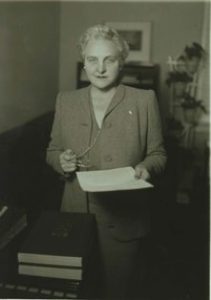
| 1 | Frances Bolton from the Encyclopedia of Cleveland |
| 2 | Frances Payne Bolton Biography |
| 3 | The Life of Frances Payne Bolton |
www.teachingcleveland.org
{gallery}the_thirties/bolton{/gallery}
Frances Bolton from the Encyclopedia of Cleveland
BOLTON, FRANCES PAYNE (29 Mar. 1885-9 Mar. 1977), served as Republican congresswoman for 29 years and supported projects in nursing, health, and education. Born in Cleveland to banker-industrialist Chas. W. and Mary Perry Payne Bingham, and educated at HATHAWAY BROWN School and in New York City, in 1904 she began volunteering with the Visiting Nurse Assoc., which sparked her lifelong interest in nursing.
During WORLD WAR I, Bolton persuaded Secretary of War NEWTON D. BAKER† to establish an Army School of Nursing rather than rely on untrained volunteers. Believing that nurses should have college educations as well as nursing training. Bolton funded a school of nursing at Western Reserve University, enabling Western Reserve University to raise the school from a department of the College of Women to a separate college in 1923, which was renamed the Frances Payne Bolton School of Nursing in June 1935.
In 1907 she married CHESTER CASTLE BOLTON†, and had 4 children, Chas. B., Oliver P., Kenyon C., and Elizabeth. When her husband, a Republican congressman from the 22d district, died in 1939, she served out his term and was elected to the seat in her own right in 1940. During her long tenure in the U.S. House of Representatives, her major interests were nursing and foreign affairs. She sponsored the Bolton Bill creating the U.S. Cadet Nurse Corps in WORLD WAR II. As a long-time member of the House Foreign Affairs Committee, she was the first woman member of Congress to head an official mission abroad, to the Middle East in 1947. In July 1953, Pres. Eisenhower appointed her a congressional delegate to the U.N. She was defeated for reelection by Chas. Vanik in 1968 and returned to Cleveland. In addition nursing, Bolton also founded the Payne Study & Experiment Fund in 1927 to finance projects benefitting children and donated the land in LYNDHURST for HAWKEN SCHOOL. She died at her home in Lyndhurst and was buried in LAKE VIEW CEMETERY.
from the Western Reserve Historical Society
Frances Payne Bolton’s life was marked not only by her philanthropic contributions, but also by her remarkable career serving in the U.S. House of Representatives for Ohio’s 22nd district. Elected in 1939 to succeed her late husband, Chester C. Bolton, Mrs. Bolton made significant contributions to her country, especially in the areas of foreign affairs and nursing. Mrs. Bolton served as a member of the House until 1968, and she became the first woman in Congress to head an official mission abroad, become a Congressional delegate to the United Nations, and become a ranking Republican on the House Foreign Affairs Committee. She also became half of the first mother-son team in Congress.
It is no surprise that Mrs. Bolton would end up representing her country in some way. Although her father was not involved in politics, both of her grandfathers, William Bingham and Henry B. Payne were state legislators, and her maternal grandfather later served as a U.S. senator. She was born on March 29, 1885 to Charles W. Bingham and Mary Perry Payne Bingham in Cleveland, Ohio. While she would not become independently wealthy until some years after her marriage, she grew up on a section of Euclid Avenue referred to as Millionaires’ Row. Although she did not attend college, she received a more than ample education (and later many honorary degrees) through her attendance at Hathaway Brown School in Cleveland, Miss Spence’s School in New York, her travels abroad, and through her family library.
After her marriage to Chester Bolton in 1907, Mrs. Bolton received a large inheritance from her uncle, Oliver Hazard Payne, the treasurer of Standard Oil as well as one of the richest men in the country. The inheritance allowed her to further pursue her interest in nursing. She used this interest and her own influence during World War I to help establish the Army School of Nursing. The Frances Payne Bolton School of Nursing at Western Reserve University was also established through her generosity to provide nursing students an education as opposed to on-the-job training. The gift from her uncle also allowed her to establish the Payne Study & Experiment Fund (later called the Payne Fund) in 1927. The Payne Fund distributed money to help fund projects on topics such as juvenile reading and drug trafficking. The Payne Fund also supported psychic research & parapsychology at the Ohio State University, the University of Chicago, and the University of Utrecht. Mrs. Bolton also joined forces with her siblings, Elizabeth Blossom and Messrs William and H.P. Bingham in donating $1 million to Yale University as an endowment for a dormitory in their father’s name.
After her terms in Congress, Mrs. Bolton stayed active in politics and humanitarian efforts, serving on the board of governors of the Middle East Institute. Additionally, she served as a trustee for numerous organizations including the National Trust of Historic Preservation, Tuskegee Institute, the U.S. Capitol Historical Society, and the School of Advanced International Studies at Johns Hopkins University. In 1973, the School of Advanced International Studies established a chair in her name for African studies, and in 1976 she received the Human Relations Award from the National Conference of Christians and Jews.
From PBS/Channel 13 New York – “The Life of Frances Payne Bolton – politician, humanitarian, philanthorpist and patriot”
The link is here